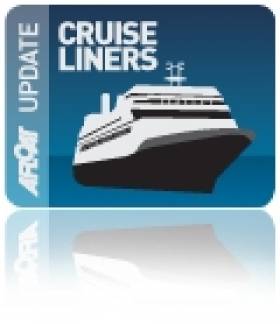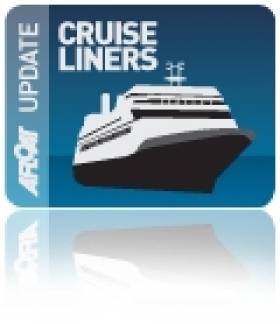Displaying items by tag: Silver Whisper
Silverseas Sails to Shannon Estuary
#SHANNON SILVERSEAS - The mid-west port of Foynes is playing host to the ultra-luxurious Silver Whisper (2001/28,000grt) which docked along the Shannon Estuary this morning, writes Jehan Ashmore.
The vessel operated by Silverseas Cruises had sailed from Southampton and at least another call by another vessel is also scheduled this season. On average the Shannon Foynes Port Company handles four cruise calls each season.
One of the main visitor attractions along the Shannon is the local Foynes Flying Boat Museum, which retraces an altogether different era in transportation, yet also carried out travel in style when the B314 flying boats used the Co. Limerick terminal between1937-1945. Then the trans-Atlantic travellers spent time at the Foynes hub-terminal which also became home to the 'Irish Coffee'.
On board the 382 passenger capacity vessel she has a near equal number of crew at 302. This passenger to crew ratio is exceptionally high and reflects her status in the very top end of the cruise travel market. Silverseas have over the years won a whole string of globally recognised travel industry awards.
All accommodation on board the 186m / 610ft long vessel is based in suites cabins (available in seven grades) with each featuring a balcony of ocean views and countless destinations.
Facilities include boutique shopping; a wellness spa with beauty salon, fitness centre and sauna; full-scale productions in a multi-tiered show lounge; a casino, an internet café and Wi-Fi service. To read the full range of facilities and virtual tours click HERE.
In 2012 the Silver Whisper cruising schedules are to Brazil then to South Africa and the Indian Ocean landscapes. Beyond that she heads for the South China Sea, west to the Arabian Sea and Egypt.
During the summer she explores Europe before arriving in Canada for autumn's vibrant 'fall'. Silver Whisper's globetrotting culminates in the Caribbean with cruises through the year's end.
Cruiseships Head for Cobh in advance of Queen Elizabeth
The 2,500 passenger Jewel of the Seas has a nine-deck centrum which has glass lifts which allows light to flow throughout the spacious and airy ship. Activities range from golf to climbing, a spa and sumptuous restaurants.
When the 2004 built cruiseship docks at the dedicated cruise berth at Cobh in the early hours of tomorrow she will also be sharing the deepwater berth with the 2001 built Silver Whisper. The ultra-luxury vessel accommodates only 388 passengers and is operated by SilverSeas Cruises. To read more about the vessel click HERE.
Both vessels are scheduled to depart Cobh around teatime tomorrow and this will be followed by preparations of the picturesque town which is to welcome the maiden call to Cobh of Queen Elizabeth on Saturday. To read more about the newest vessel of the Cunard Line fleet click HERE. The 2010 built vessel will firstly make an inaugural call to Dublin on Friday prior to the Cobh call which coincides with Cork Harbour Open Day, for event details visit www.corkharbour.ie






























































